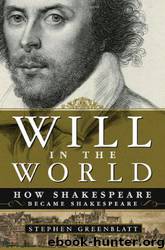Will in the World: How Shakespeare Became Shakespeare by Stephen Greenblatt

Author:Stephen Greenblatt [Greenblatt, Stephen]
Language: eng
Format: epub, mobi
ISBN: 9780393327373
Google: LAiYWsI5jUoC
Amazon: 039332737X
Publisher: Random House
Published: 2004-01-01T18:30:00+00:00
Look in thy glass, and tell the face thou viewest
Now is the time that face should form another.
(3.1–2)
By looking longingly at his reflection, in contemplation of his own beauty, the young man will resolve to do in the flesh what he has done by standing in front of the mirror: produce an image of himself. It is through reproduction—“fresh repair”—that a person can truly love himself by projecting himself into the future; only a fool would “be the tomb / Of his self-love to stop posterity” (3.3, 7–8).
As a subject for sonnets, this procreation theme is wildly unusual, perhaps unprecedented. A sonneteer characteristically woos his beloved or laments her coldness or analyzes his own intense passion. He does not tell a young man that in order to make a precise copy of his own exquisite face, he should resolve to reproduce. Had he written sonnets in praise of the young man’s prospective bride, Shakespeare could have held onto at least a semblance of conventionality. He would, in that case, have functioned like one of the painters hired in long-distance marriage negotiations to produce an image of the proposed spouse. But he did nothing of the kind. Though he is urging the youth to eschew masturbation and have sex with a woman—do not “spend / Upon thyself,” he writes with striking explicitness, do not have “traffic with thyself alone” (4.1–2, 9)—the identity of the woman, the prospective mother of his child, is apparently a matter of indifference. No woman, he writes, will refuse: “where is she so fair whose uneared womb / Disdains the tillage of thy husbandry?” (3.5–16).
The vision of reproduction Shakespeare is offering his young man is not absolutely female-free, but, within the limits of the flesh, it reduces the role of the woman to the barest minimum: a piece of untilled ground that has not yet brought forth ripe ears of corn. The whole project will be spoiled if the child bears any resemblance to its mother, for the goal is to produce a mirror image of the father alone. In the fertile soil of a nameless, faceless breeder—and, if nameless and faceless, why not simply accept the choice that his guardian has already made for him?—the young man will plant the seed of his own perfect beauty. That beauty itself possesses whatever one might hope to find in a woman’s face: “Thou art thy mother’s glass,” the poet tells the young man, “and she in thee / Calls back the lovely April of her prime” (3.9–10).
A painting has recently been discovered that is thought to be a portrait of Southampton at the time that Shakespeare’s procreation sonnets were probably written. The image is a startling one because it transforms what had always seemed hyperbolic in the language of the sonnets into something quite literal. The long ringlets, the rosebud mouth, the consciousness of being “the world’s fresh ornament” (1.9), the palpable air of a young man in love with himself, and, above all, the sexual ambiguity make
Download
Will in the World: How Shakespeare Became Shakespeare by Stephen Greenblatt.mobi
This site does not store any files on its server. We only index and link to content provided by other sites. Please contact the content providers to delete copyright contents if any and email us, we'll remove relevant links or contents immediately.
| Ancient & Classical | Arthurian Romance |
| Beat Generation | Feminist |
| Gothic & Romantic | LGBT |
| Medieval | Modern |
| Modernism | Postmodernism |
| Renaissance | Shakespeare |
| Surrealism | Victorian |
4 3 2 1: A Novel by Paul Auster(12391)
The handmaid's tale by Margaret Atwood(7762)
Giovanni's Room by James Baldwin(7346)
Asking the Right Questions: A Guide to Critical Thinking by M. Neil Browne & Stuart M. Keeley(5772)
Big Magic: Creative Living Beyond Fear by Elizabeth Gilbert(5771)
Ego Is the Enemy by Ryan Holiday(5445)
The Body: A Guide for Occupants by Bill Bryson(5096)
On Writing A Memoir of the Craft by Stephen King(4942)
Ken Follett - World without end by Ken Follett(4731)
Adulting by Kelly Williams Brown(4574)
Bluets by Maggie Nelson(4554)
Eat That Frog! by Brian Tracy(4535)
Guilty Pleasures by Laurell K Hamilton(4448)
The Poetry of Pablo Neruda by Pablo Neruda(4106)
Alive: The Story of the Andes Survivors by Piers Paul Read(4031)
White Noise - A Novel by Don DeLillo(4009)
Fingerprints of the Gods by Graham Hancock(4004)
The Book of Joy by Dalai Lama(3986)
The Bookshop by Penelope Fitzgerald(3852)
